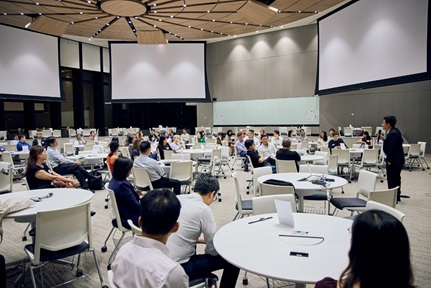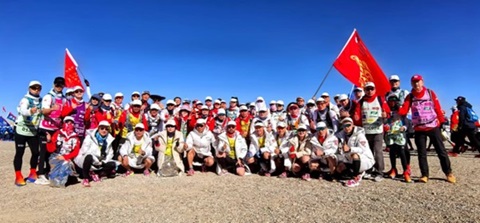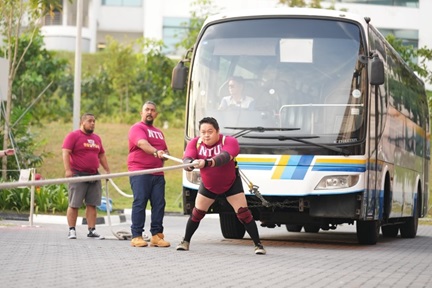The Great Singapore Resignation: Fact or myth?
Prof Boh Wai Fong shares that there is pent-up demand for a change in job, accumulated over the past one or two years while employees were waiting for the pandemic to abate.
It is a trend that has been called "The Big Quit", "The Great Resignation", or even "Lying Flat", as scores of people in countries around the world leave their jobs.
A QuitTok fad has even popped up on social media, with people posting about their resignations on video platform TikTok.
In Singapore, however, although the term has gained popularity as well, official data shows that there has been no Great Resignation so far.
But trouble for employers could be brewing under the surface as the average monthly resignation rate for professionals, managers, executives and technicians (PMETs) crept up last year to a seven-year high of 1.5 per cent in the third quarter, according to the latest available data.
Still, this means that 98.5 per cent of PMETs stayed in their jobs.
The rate, which is for employees of all nationalities and includes those who switched jobs as well as those who stopped working, was 1.3 per cent in the third quarters of 2018 and 2019.
Manpower experts say turnover rates are likely to rise this year if the economy continues to recover.
"The rate of voluntary turnovers among PMETs may continue to increase this year if the recent Omicron variant (of Covid-19) does not impede economic recovery and the growth is better than forecast as well as if there are better and more job opportunities available," says Dr Sherwin Chia, a senior lecturer who teaches human resource (HR) management at the Singapore University of Social Sciences.
The overall resignation rate has remained slightly below pre-pandemic levels, as far as the latest data shows.
The seasonally adjusted average monthly resignation rate for the third quarter of last year was 1.6 per cent, according to the labour market report released by the Ministry of Manpower (MOM) on Dec 15.
From 2018 to 2019, the quarterly average resignation rate was 1.8 per cent, it said.
In contrast, the latest United States data shows that monthly resignations reached a record high in November, with more than 4.5 million people quitting their jobs. This is about 3 per cent of total employment there.
In Singapore, resignations have far from skyrocketed, but MOM noted last month in its labour market report that turnover trends in the third quarter were mixed for industries and occupations.
The average monthly resignation rate for PMETs rose in the first three quarters of last year, from 1.1 per cent in the first quarter to 1.3 per cent in the second and 1.5 per cent in the third. It was the first time since 2014 that the rate rose above 1.4 per cent.
PMETs make up about 62 per cent of Singaporeans and permanent residents in jobs here.
Sectors where PMETs formed a larger share of the workforce, such as financial services, professional services, and health and social services, saw higher resignation and recruitment rates compared with the previous quarter, said MOM.
But in other sectors like retail trade and food and beverage services, they declined or remained unchanged, it noted.
Singapore Human Resources Institute president Low Peck Kem says the difference could be partly because PMETs are in a better position to acquire skills that are more transferable and less homogeneous, compared with workers with only one skill such as packing. Employers are prepared to pay a premium to attract people with highly sought-after skills.
"From an employee's perspective, if they have the skills, know that they are in high demand and are given a better offer - in terms of pay, developmental opportunities and work arrangement - it is difficult not to make a move," Ms Low says.
This was the case for digital marketer Keven Teo, who left his job in an IT start-up in August last year for one with better opportunities for personal growth.
The 27-year-old felt that his learning curve had plateaued as he had spent a year running the digital marketing operations alone and being exposed to a wide scope of duties. He was curious to know how his skills compared with peers.
He now earns about 15 per cent more in the advertising industry.
"Salary does play a small part (in why I changed jobs), but the main push is really to learn more as someone who just joined the industry," he says.
Another reason that may have prompted some resignations among PMETs is the remote working model that most had to pivot to during the pandemic, says DBS Bank senior economist Irvin Seah.
"This turned out to be exceptionally efficient and thus more stressful. For example, the one hour of commuting time saved can become a meeting slot. Even lunchtime virtual meetings have become so common," he says.
"Two years of this high-stress working model have made people question the very purpose of their work and whether they want to continue with this work-life balance."
More to come this year?
The tight labour market seems to favour job seekers at the moment, with a seasonally adjusted ratio of 209 job vacancies in September to every 100 unemployed people, according to MOM's latest data.
Experts say there could be more resignations this year, assuming the Omicron variant does not hinder economic recovery.
There is pent-up demand for job changes accumulated over the past one or two years while employees were waiting for the pandemic to ease off, says Professor Boh Wai Fong, deputy dean of Nanyang Technological University's Nanyang Business School.
"Amid the economic panic in 2020, workers were unwilling to sacrifice income security for happier and healthier work environments," she says.
ManpowerGroup Singapore country manager Linda Teo says there may be more resignations in the next few months after the bonus, or lack thereof, is announced or paid out.
Ms Jaya Dass, managing director at Randstad Singapore and Malaysia, says more may be motivated to search for greener pastures if their new expectations on flexible work arrangements and work-life balance are not met as work starts to shift back to offices.
Recent surveys also suggest that job changes are on the minds of many people.
A survey of about 1,000 Singapore workers by global jobs portal Indeed, conducted in December, found that nearly one in four (24 per cent) Singapore respondents intends to resign in the first half of 2022.
A report by NTUC LearningHub last week said 10 per cent of the 450 employees surveyed in December were actively looking for a new job.
Though this is a smaller proportion than the 14 per cent who said so in the previous year's survey, when those who were open to a new job but were not actively looking are included, the figure for both years is the same: 70 per cent.
Nevertheless, resignations here are not expected to reach the levels seen in countries like the US.
Ms Teo says this is partly because Singapore's small size means opportunities for new jobs are limited.
Mr Seah adds: "By and large, the Singapore economy has weathered the pandemic fairly well. So in the recovery process, we will not see that high a level of churn being manifested in the labour market."
Furthermore, the trend in the US stems from people resigning to take a break and rest on unemployment benefits, notes Mr Gerald Tan, projects director of career service provider Avodah People Solutions.
The context is very different in Singapore, where unemployment is falling and the collective societal norm around career and jobs is still mainly practical, meaning work is for survival needs, he says.
"The effect of resignation without a job may, however, be more pronounced among millennials as they are likely to have low family and financial commitments and are able to be more mobile and aspirational in their career decisions," he adds.
Challenges for employers
Human resources (HR) experts say that while employers need to focus on developing workers' skills and giving them opportunities to progress, they should also look at addressing their mental, physical and emotional needs.
HR consultancy Mercer Singapore reward products leader Mansi Sabharwal similarly says that employers should work on both talent strategy and enhancing business productivity, as workers are now as driven by company culture, enhanced benefits and flexibility as they are by pay.
Ms Dass says that HR leaders could consider offering new benefits such as stipends for work-from-home set-ups, better insurance coverage, mental or physical healthcare, and caregiver benefits.
Ms Pip Lyons, senior people scientist at worker survey platform Culture Amp, recommended in a recent webinar that employers invest in their managers, as people who rated their managers as being "very effective" during the pandemic were more likely to be highly engaged and intend to stay with their company, compared with those who have ineffective managers.
Ms Teo adds that in order to help staff sustain their mental health, companies need to create a conducive environment where employees feel supported instead of constantly feeling the pressure to deliver work.
For instance, managers can have regular check-ins with their subordinates to talk about their life and not just work, so that they feel comfortable about sharing their problems and asking for help if needed.
"Having said that, individuals also need to take care of their individual mental well-being as well and be willing to ask for help when needed," she says.





.tmb-listing.png?Culture=en&sfvrsn=64dc3641_1)
